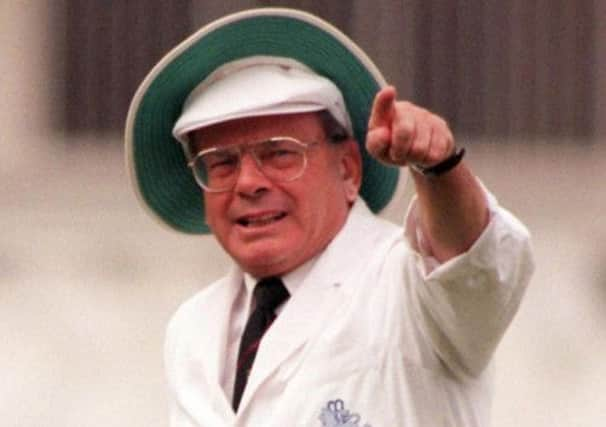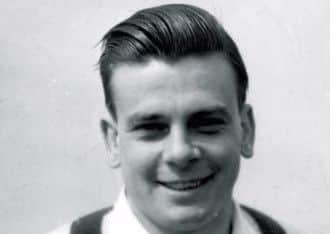Dickie Bird: From colliery to cricket field... how I opened the innings of my sporting life


I shudder to think back to the time, in my teens, when I used to attend the winter nets at Headingley.
I had to get up at 4.30 in the morning to go to work at Monk Bretton Colliery. When I’d finished my shift, I’d have a bath, get changed, grab a bite to eat, get my cricket gear together, pack my bag and then off I’d go to take the bus from Barnsley to the centre of Leeds. From there I caught a tram to Headingley.
Advertisement
Hide AdAdvertisement
Hide AdI know the memory can play tricks but, as I recall, if it wasn’t lashing it down with rain or blowing a gale, it was snowing like mad or bitterly cold.


It wasn’t much warmer in the indoor nets, either. There was no heating and we practised on old wooden boards. It was heaven to get back in the dressing room, where there was a fire to thaw out numbered fingers and thumbs. Even now, I can picture the coach, Maurice Leyland, wrapped up in an overcoat, cap on head, warming his hands in front of that fire.
Afterwards, it was back on the tram to Leeds, then the bus home. By the time I flopped into bed, it would be about 11.30. I’d snatch five hours’ sleep if I was lucky, before clambering bleary-eyed out of bed for work next morning. I did that two nights a week every January and February until I finally signed for Yorkshire.
Those were the days, eh?
I have to admit that there were times when I wondered if it was all worthwhile. But I said to myself, “Come on, Dickie lad, don’t let all this be for nothing.” Now I can look back with great satisfaction and think, “It wasn’t, was it?”
Advertisement
Hide AdAdvertisement
Hide AdI might not have been able to take advantage of that winter coaching, however, had it not been for Mr Charlton, the manager of Monk Bretton where I worked as a fitter on the pit top. It was he who also finally gave me leave to go to Headingley for my Yorkshire trial and, as you can imagine, I was a bag of nerves, although it helped that Michael Parkinson was also having a trial.
The coach, Arthur Mitchell, came up to me and asked: “Is this bloke wi’ thee?”
“Yes, Mr Mitchell.”
“Mm, does ‘e fancy ‘imself as a batsman?”
“He does Mr Mitchell. He’s an opener.”
“Is ‘e now,” he said, thoughtfully stroking his chin. “And tell me, as ‘e got a job?”
“Oh, aye, he’s a journalist Mr Mitchell.”
“A journalist, eh? Well, ‘aving just seen ‘is efforts as a cricketer, would you mind passin’ on a bit of advice from me? Tell ‘im to stick to journalism.”
Advertisement
Hide AdAdvertisement
Hide AdThen it was my turn to get padded up. Mitchell, who was a really dry character, turned to me and queried, “Reight then, and where are you from, son?”
I stuck out my chest proudly. “Barnsley,2 I answered.
“Oh, no not another one. Not a batsman as well are you by any chance?”
“As a matter of fact, I am, Mr Mitchell.”
“Then put pads on, and them three likely lads there will send thee a few balls down. Let’s see what tha’s made on.”
I looked at “them three” and trembled. They were Freddie Trueman, at that stage a highly-thought of 18-year-old who was already making quite a name for himself; Bob Appleyard, a marvellous off-cutter and Johnny Wardle, a slow left-arm bowler at the peak of the powers which earned him a place in the England team. To add to my discomfort, I was to face them on a rain-affected strip.
Advertisement
Hide AdAdvertisement
Hide AdWardle bowled the first ball. It was a Chinaman, which turned and lifted. My tentative forward prod was nowhere near it. Then came Appleyard with one that went straight through the gate. Finally Trueman roared in and I played my shot nearly a fortnight after the ball had sped past me.
I was in the net for 15 minutes and I can’t recall making contact with a single delivery. At the end of the session Mitchell strolled over to me and said, “If tha’s going to play like that, it’s not worth they while coming here again.”
I thought that was the end of my Yorkshire prospects and I almost didn’t go back. But Dad had other ideas. “Tek no notice. Thee go back, son, and show that old so-and-so.” And I did. Surprisingly, Mitchell and I got on like a house on fire after that. He appreciated the character, determination and stubbornness that I had shown. It was what he had been hoping for. It was a method he had of sorting the men from the boys.
At the time I had my Yorkshire trial, I was a £4-a-week professional at Barnsley and I opened the club’s Yorkshire League batting with Parky many times. He was a pretty useful left-handed batsman with a big ambition, like me, to open the batting for Yorkshire, and, do you know, I reckon that if he had been playing now, he would have been good enough to play for the county, but not then, because they had such a strong side.
Advertisement
Hide AdAdvertisement
Hide AdI really enjoyed those days at Barnsley’s Shaw Lane ground, when you could always rely on the wags in the crowd – there were plenty of them around – to liven up proceedings. There was one match when the pitch needed a patting down at frequent intervals and on one occasion I gave it a right whack with the bat.
As I did so I heard this chap shout out, “Here, don’t bash it too hard, Birdy; there’s men working under there.” He was right. A seam from Dodworth Colliery ran right under the ground.
Also in the team was yet another miner’s son, a schoolboy from the mining village of Fitzwilliam by the name of Geoffrey Boycott, who batted at six when he first arrived but gradually worked his way up the order. I remember all too clearly being 49 not out against Sheffield United at Shaw Lane and turning the off-spinner neatly through a gap on the leg side towards the midwicket boundary. In those days they always went round with the hat to take up a collection for half centuries, as well as centuries, and as there was a fairly large crowd I was looking forward to picking up a bob or two.
I set off for the easy single, calling, “Come one” as a matter of course. Boycott was at the other end – and he remained stubbornly anchored to his crease. As I reached him, he said cheerfully, “Keep on running Dickie; the pavilion’s that way.”
Advertisement
Hide AdAdvertisement
Hide AdGeoff, of course, became infamous for such incidents as was illustrated at one cricket function much later on when the great batsman Colin Cowdrey turned up wearing a new tie which showed the three lions of England with a number 75 underneath.
Someone asked what the 75 meant and he explained, “Oh, that’s the number of batsmen Geoff Boycott has run out in Test cricket.”
At the same event, another England batsman, Peter Parfitt was spotted with a similar tie, except that his carried the number five. “In case you’re wondering,” he said, “that represents the number of people Geoff Boycott hasn’t run out in Test cricket.”
There was also the time when Geoff refused to open the innings for Barnsley’s Yorkshire League side. Hubert Padgett usually opened with me but was unavailable for a game at Hull and so our captain, Norman Umbers, asked Geoff to take his place.
Advertisement
Hide AdAdvertisement
Hide AdHe retorted, “No way! I’m not opening. I’ll bat at number three. Let someone else go in and knock the shine off the ball, then I’ll go in and finish it off.”
In the end, wicketkeeper Eddie Legard, who went on to play for Warwickshire, volunteered to open.
So we went out there, Eddie and me, with Hull having made 186 in their opening knock – and we knocked the runs off without losing a wicket!
As we walked in triumph from the field into the dressing room, expecting to be congratulated on our match-winning partnership, we were met by the sight of a furious Boycott flinging his bat across the room and shouting, “Why didn’t one of you get out and give me a chance to bat?”
Advertisement
Hide AdAdvertisement
Hide AdWell, he did have his chance, didn’t he? I reckon it was an open-and-shut case.
Dickie Bird 80 Not Out – My Favourite Cricket Memories is published by Hodder and Stoughton, priced £20. To order a copy from the Yorkshire Post Bookshop call 01748 821122.
Injury dashed football hopes
Born in Barnsley in 1933, he followed his second love, cricket, when a knee injury put paid to playing football professionally.
Between 1956 and 1964, he played first class cricket for both Yorkshire and Leicestershire. After his county career, he coached and played league cricket before becoming an umpire.
Advertisement
Hide AdAdvertisement
Hide AdHe stood in his first county game in 1970 and three years later, he officiated at his first Test match, England v New Zealand at Headingley Stadium in Leeds.
By the time of his retirement in 1996, he had umpired in 66 Test matches (at the time a world record) and 69 One Day Internationals including three World Cup Finals.